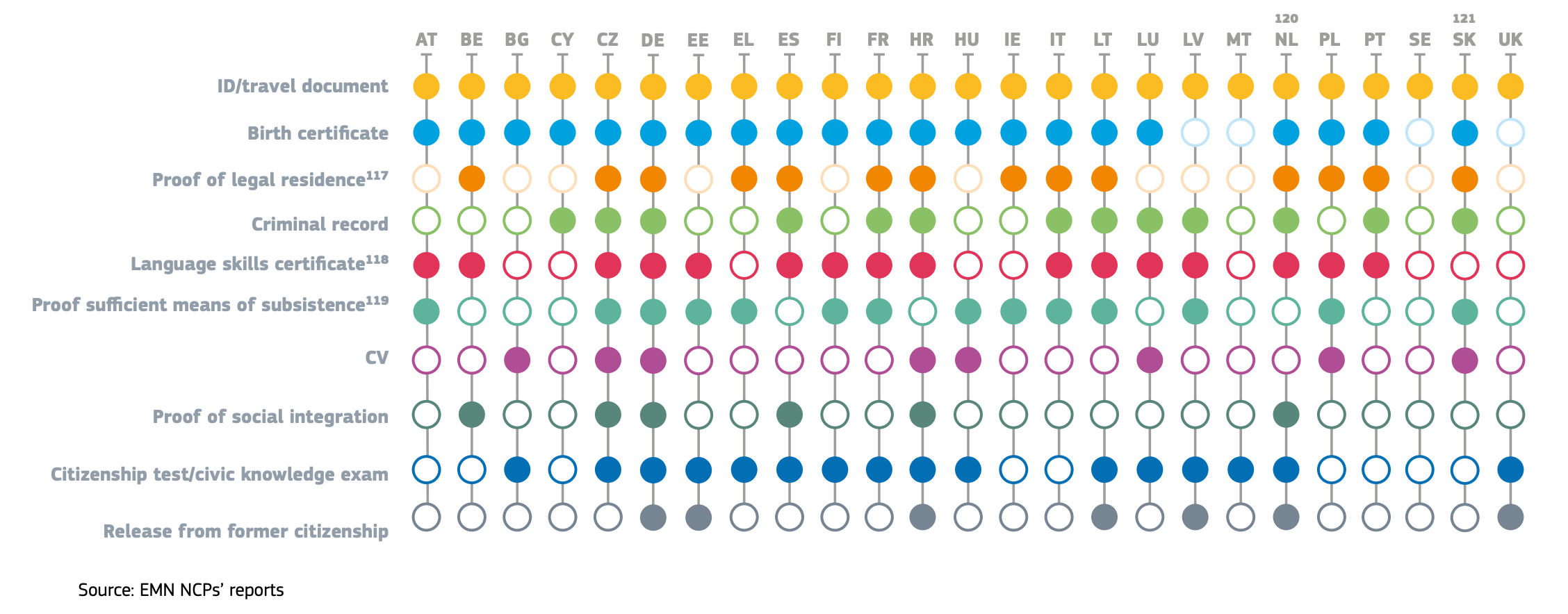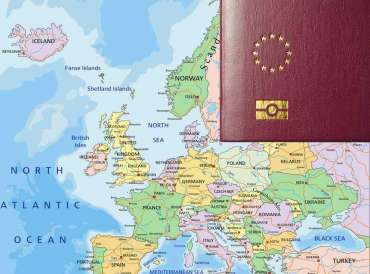Citizenship is the particular legal bond between an individual and their State. Over the years the citizenship conferred by EU member states have become more restrictive with stricter criteria requiring skills language, culture, history, social integration etc..
Member States require citizenship applicants have to provide a number of different documents to prove their identity, the fulfilment of legal conditions (e.g. period of legal residence) and sufficient economic and social integration.
These important documentation include
- ID or Travel document
- Birth certificate
- Proof of legal residence
- Criminal record or police certificate
- Language skills certificate
- Proof of sufficient financial means
- Curriculum Vitae (CV)
- Proof of social integration
- Citizenship / Civic knowledge exam
- Release of former citizenship (renunciation)
Comparison of Naturalization for citizenship conditions in EU member states

Source: European Commission
Which EU member states specifically require civic test, language test and social integration?
Take a look at the comparison table below
| Citizenship / Civic knowledge test | Social integration | Language test | |
| Austria | N | N | Y |
| Belgium | N | Y | Y |
| Bulgaria | Y | N | N |
| Cyprus | N | N | N |
| Czechia | Y | Y | Y |
| Germany | Y | Y | Y |
| Estonia | Y | N | Y |
| Greece | Y | N | N |
| Spain | Y | Y | Y |
| Finland | Y | N | Y |
| France | Y | N | Y |
| Croatia | Y | Y | Y |
| Hungary | Y | N | N |
| Ireland | N | N | N |
| Italy | N | N | Y |
| Lithuania | Y | N | Y |
| Luxembourg | Y | N | Y |
| Latvia | Y | N | Y |
| Malta | Y | N | N |
| Netherlands | Y | Y | Y |
| Poland | N | N | Y |
| Portugal | N | N | Y |
| Sweden | N | N | N |
| Slovakia | N | N | N |
| UK | Y | N | N |
Y – Yes
N – No
Source: European commission study in 2020
Citizenship Tests
In 13 Member States, citizenship applicants are required to pass a citizenship or integration test for all naturalisation grounds. Usually, the tests are designed to demonstrate a basic knowledge of the country’s political system, history, culture and values as well as underlying rights and obligations
The design of the tests varies across Member States. Usually, it takes place in the form of a written, multiple-choice exam, while some Member States. No formal citizenship test exists in Belgium and Slovak Republic, the authorities verify the applicant’s level of ‘social integration’.
Applicants also asked for fulfilment of their civic obligations such as payment of taxes and debts.
Language test
In 22 Member States, knowledge of the official language(s) is a prerequisite for citizenship through ordinary naturalisation, demonstrating the importance that national governments place on ensuring that new citizens are able to understand and communicate with the new government and fellow citizens, and hence facilitating integration.
In Cyprus, Ireland and Sweden, applicants do not have to meet any language requirements for ordinary naturalisation. Portugal, Spain and the United Kingdom also have exemptions in place for applicants originating from countries where the language of the country of application is spoken. For example, in Spain citizens from Latin American countries are exempted.
Oaths
Applicants are also required to pledge formal allegiance to the respective Member State as part of a condition to acquire citizenship in 16 Member States. The pledge usually takes place in the form of an oath of allegiance
Good character
Applicants must fulfil requirements regarding good conduct and/or public order as a prerequisite for acquiring citizenship





